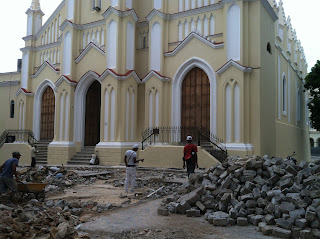The Plaza de Armas (literally "Weapons Square") is Havana's oldest square. Most cities constructed by the Spanish Conquistadores were designed on a standard military fashion based on a grid pattern, taken from the Roman Castrum, of which one of the blocks would be left vacant to form the Plaza de Armas. It is often surrounded by governmental buildings, churches, and other structures of cultural or political significance. The name derives from the fact that this would be a refuge in case of an attack upon the city, from which arms would be supplied to the defenders.
This plaza is focus of much of the sreet life of the restored city. A second-hand book market sells revolutionary literature. The Palacio de los Capitanes Generales (1780) is the finest example of Baroque architecture in Havana, home to the Spanish governor until independence, home to Cuban presidents until 1917, and finally the mayor's office. It now houses the City Museum.
On the NW side of square is the Palacio del Segundo Cabo, HQ of the Spanish vice-governor (photos). The Castillo de la Real Fuerza (1577) is the oldest building in Havana. Topping its tower is the bronze figure of La Giraldilla de la Habana, wife of conquistador Hernando de Soto, searching Florida for the fountain of youth. She spent 4 years in the tower watching for his return.
 |
| Book Museum Courtyard |
 |
| used book market |
 |
| Castillo de la Real Fuerza |
 |
| La Giraldilla de la Habana (bronze figure) |























































